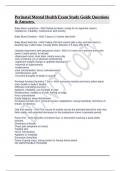Perinatal Mental Health Exam Study Guide Questions
& Answers.
Baby blues symptoms - ANS feeling let down, crying for no apparent reason,
impatience, irritability, restlessness and anxiety.
Baby Blues Duration - ANS 2 days to 2 weeks after birth
Baby Blues feels like - ANS Taking 100 birth control pills a day and then back to
baseline day 3 after baby. Usually better between 3-5 days after birth
Unipolar depression with periparum onset - ANS 5 or more six’s present during the
same 2 week period, to include:
-depressed mood, most days, nearly every day
-loss of interest, joy or pleasure (anhedonia)
-significant weight change or appetite disturbance
-insomnia or hypersomnia
-restlessness
-poor concentration, focus, indecisiveness
-worthlessness, guilt
-recurrent thoughts of death or suicide
Perinatal Anxiety Disorders 7 Six’s - ANS excessive anxiety and worry (often about
one's health or baby's health)
Difficulty controlling worrying
Agitation, irritability, can escalate to rage
Restlessness, inability to sit still, feeling on edge
Poor concentration
Easily fatigued, sleep disturbance
Increased somatic six’s, (muscle tension, palpitations, racing heartbeat, shortness of
breath, GI distress)
Dad and anxiety - ANS The course of anxiety across the perinatal period for men was
fairly stable, with potential decreases in the postpartum (more in prenatal period)
Panic D/O - ANS Episodes of intense fear, or discomfort reaching a peak within
minutes.
Shortness of breath
Chest pain (elephant on chest)
Tingling skin
Hot or cold flashes
Agitation or irritability
Excessive worry/fear
Fears of going crazy, losing control or having future attack
NO IDENTIFIABLE TRIGGER
,3 Greatest Fears of Panic D/O - ANS Fear of dying
Of going crazy
Of losing control
Perinatal OCD Obsessions - ANS Recurrent, persistent thoughts, urges or impulses that
are intrusive and unwanted and cause marked anxiety or distress.
Attempts to ignore or suppress or neutralize them with some other thought or action
Thoughts does not mean an action will be taken!
Perinatal OCD Compulsions - ANS Repetitive Behavior that the individual feels driven to
perform in response to obsession. (Check on baby when sleeping)
Behaviors or mental acts are aimed at preventing or reducing anxiety or distress
Perinatal OCD vs. Psychosis - ANS OCD- parent recognizes thoughts/images are
unhealthy
-extreme anxiety related to thoughts/images
-overly concerned about becoming crazy
Psychosis- parent may not recognize thoughts are unhealthy
-may seem to have less anxiety when indulging in thoughts/bus
-minimal insight about the distortion of thought/image, NO SHAME
Low Risk OCD thoughts - ANS not random, but excessive/obsessive
Several x's in one hour and throughout the day
No delusions or hallucinations to harming baby
Parent has taken steps to protect the baby
Thoughts are scary to the parent
High Risk Psychotic Thoughts - ANS need to save baby by taking its life
Parent has delusional beliefs about the baby (demon)
Thoughts are ego-syntonic, parent thinks they are reasonable, and or feels tempted to
act on them.
What is a Trauma - ANS Directly experiences the event
Witness the event in person
Indirect exposure to the aversive details of trauma (provider)
Causes clinically significant distress or impairment in person social interactions,
capacity to work, or other areas of fox.
Not physiological result of another medical condition or substance use.
4 Categories of PTSD - ANS Symptoms follow a traumatic event that last for more than
one month after event.
Criterion B- intrusion, flashbacks, nightmares, physical reactivity
Criterion C- avoidance, constricted emotions, social w/drawl, denial, apathy, emotional
numbing.
, Criterion D- negativity in cognitions and mood, guilt, depression, irritability,
hopelessness.
Criterion E- arousal; sleep disturbance, poor concentration, aggression, hyper vigilance.
Potentially Traumatic Perinatal Events - ANS -emergency C-section
-postpartum hemorrhage
-prematurity
-stillbirth
-unexpected NICU admission
-forceps, vacuum extraction
-severe preeclampsia
-3-4 degree laceration
-hyperemesis gravidarium
-traumatic vaginal birth
-fetal anomaly
-witness partners birth experience
-shoulder dystocia
-long labor process
-failed pain medication or poor response to anesthesia
PTSD Themes - ANS perception of lack of caring
Felt abandoned
Stripped of dignity
Lack of support or reassurance
Poor communication
Mother felt invisible
Feeling of powerlessness
Betrayal of trust
Didn’t feel protected by staff
Maternal Mortality - ANS 1,200 women in US suffer complications during pregnancy or
childbirth that prove fatal and 60k near fatal.
Maternal Near Miss Survivors - ANS An event where an individual nearly dies due to
pregnancy or childbirth related complications.
Events are unexpected and may leave survivor isolated and alone
It may affect how respond to future pregnancies, labor and birth experiences
Perinatal Bipolar D/O - ANS Over 70% of women with BP who stop medication when
pregnant become ill during the pregnancy.
Postpartum Psychosis Prevalence - ANS Occurs in every 1 to 2 of every 1,000
deliveries, .2%
Postpartum Psychosis Onset - ANS rapid in onset following childbirth and is true signs
of psychosis; within first 4 weeks of childbirth.




